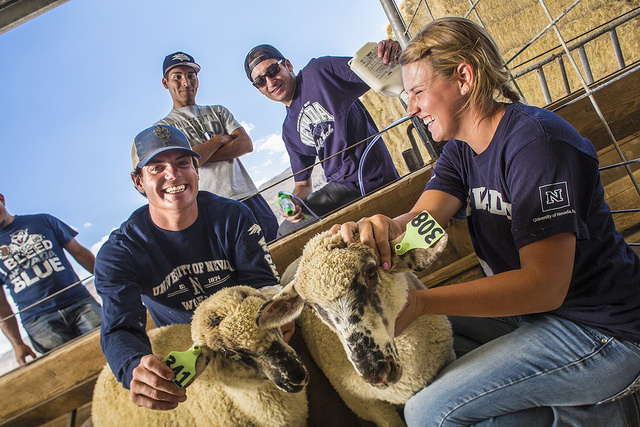University General Course Catalog 2017-2018 ARCHIVED CATALOG: LINKS AND CONTENT ARE OUT OF DATE. CHECK WITH YOUR ADVISOR.
College of Agriculture, Biotechnology and Natural Resources
|
|

William Payne, Dean
Fleischmann Agriculture
(775) 784-1660
The mission of the College is to educate students as they endeavor to enhance quality of life and economic vitality through the responsible use of plant, animal and other natural resources utilizing advances in biological technologies and the environmental sciences. Central to this mission is the protection, utilization and management of the soil, water, air, plant, animal, and human resources; the economic vitality of the agriculture industry; the development and implementation of technologies; and the quality of the environment. Of equal importance is a concern for the proper utilization of food in promoting healthier diets, as well as the social and economic well-being of individuals, families and society.
Instructional Programs
The college provides instructional programs that emphasize applications of science, technology and theory. Excellent field and laboratory facilities provide students with realistic educational experiences. These programs prepare students for careers in agriculture, environmental science, state of the art biotechnology, dietetics and nutrition, veterinary medicine, medicine and policy making positions in the agriculture and environmental protection industries.
Bachelor’s Degree Programs
The College of Agriculture, Biotechnology and Natural Resources offers the bachelor of science degree with majors in Agricultural Sciences, Biochemistry and Molecular Biology; Environmental Science; Ecohydrology; Forest Management and Ecology, Rangeland Ecology and Management; Wildlife Ecology and Conservation; Nutrition with specializations in Nutritional Science and Dietetics; and Veterinary Science. The college also offers a combined BS/MS degree in Biotechnology. An Agricultural Education degree is offered by the College of Education.
By selecting appropriate study options, students may specialize within their major. Each option includes certain required courses and electives to be selected in consultation with the student’s advisor.
In order to graduate, students who major in College of Agriculture, Biotechnology and Natural Resources degree programs must complete a minimum of 120 credits. At least 40 of those credits must be in upper-division courses.
Agricultural Education Major
The College of Agriculture, Biotechnology and Natural Resources and the College of Education have implemented a cooperative agreement to prepare teachers of agriculture. Students who seek careers as teachers of agriculture should enroll in the secondary education program in the College of Education’s department of curriculum, teaching and learning.
They should complete the professional teaching courses in secondary education and occupational education.
Students will be required to take at least 36 credits of approved course work in the College of Agriculture, Biotechnology and Natural Resources to earn a major certification to teach agriculture education. In order to receive a teaching minor in agriculture education, students must complete 24 credits in the College of Agriculture, Biotechnology and Natural Resources.
For further information, contact either the College of Agriculture, Biotechnology and Natural Resources’ associate dean for resident instruction or the occupational education coordinator in the College of Education’s Curriculum, Teaching, and Learning Department.
|